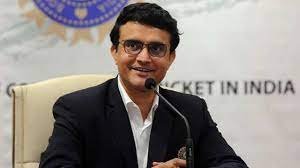Sourav Ganguly, the former Indian cricket captain and current president of the Board of Control for Cricket in India (BCCI), found himself in the midst of controversy when he commented on the ongoing protest of wrestlers. On Friday, Ganguly admitted that he was not well-versed with the details of the wrestlers’ grievances but expressed his hope for a swift resolution to the issue. However, his statement of “let them fight their battle” drew severe criticism from various quarters, including Shiv Sena MP Priyanka Chaturvedi, who took to Twitter to express her discontent.
Priyanka Chaturvedi, a Member of Parliament representing the Shiv Sena party and an active voice on social and political issues, questioned Ganguly’s stance and criticized his apparent lack of support for the wrestlers. In her tweet, she expressed her understanding for the silence of those who should be speaking up, suggesting that they consider it “not our battle” and therefore avoid taking a stand.
The controversy surrounding Ganguly’s remarks highlights the delicate balance that public figures, especially those in influential positions, must maintain when commenting on social issues. While Ganguly’s intention might have been to remain neutral and avoid making uninformed statements, his words were interpreted as indifference or a reluctance to engage in matters that did not directly concern him.
The role of sports personalities in social causes and activism has been a topic of discussion in recent times. Many argue that athletes and sports administrators, given their stature and platform, have a moral responsibility to speak up for social issues and lend their voice to those who may not have the same visibility. On the other hand, some contend that individuals should be free to choose their battles and not be obliged to comment on every issue that arises.
In Ganguly’s case, his position as a prominent figure in Indian cricket, along with his reputation as a charismatic leader during his playing days, has thrust him into the spotlight of public expectations. People often look up to sports icons as role models and expect them to use their influence to address social concerns. However, it is crucial to remember that athletes, like any other individual, have the right to decide which causes they choose to support actively.
As for Priyanka Chaturvedi’s criticism of Ganguly’s statement, it reflects the frustration felt by many when influential personalities refrain from taking a stand on contentious issues. Chaturvedi’s tweet implies disappointment with those who possess the power to make a difference but choose to remain silent due to a perceived lack of personal interest or relevance. It highlights the common sentiment that society needs champions who are willing to fight for causes beyond their immediate purview.
In response to the criticism, it is important to consider that Ganguly’s comment may have been misconstrued or taken out of context. It is possible that he was emphasizing the need for the wrestling community to come together, resolve their issues collectively, and fight for their rights. Nevertheless, the incident underscores the need for public figures to be mindful of their words and the potential impact they can have on public opinion.
In conclusion, Sourav Ganguly’s statement regarding the ongoing protest of wrestlers and his hope for a speedy resolution has drawn criticism from Shiv Sena MP Priyanka Chaturvedi. Chaturvedi’s tweet reflects the disappointment felt when influential figures choose not to take a stand on social issues. The incident prompts a broader conversation about the role of sports personalities in activism and the expectations placed upon them. Ultimately, it serves as a reminder that public figures must exercise caution and sensitivity when expressing their views on contentious matters.


